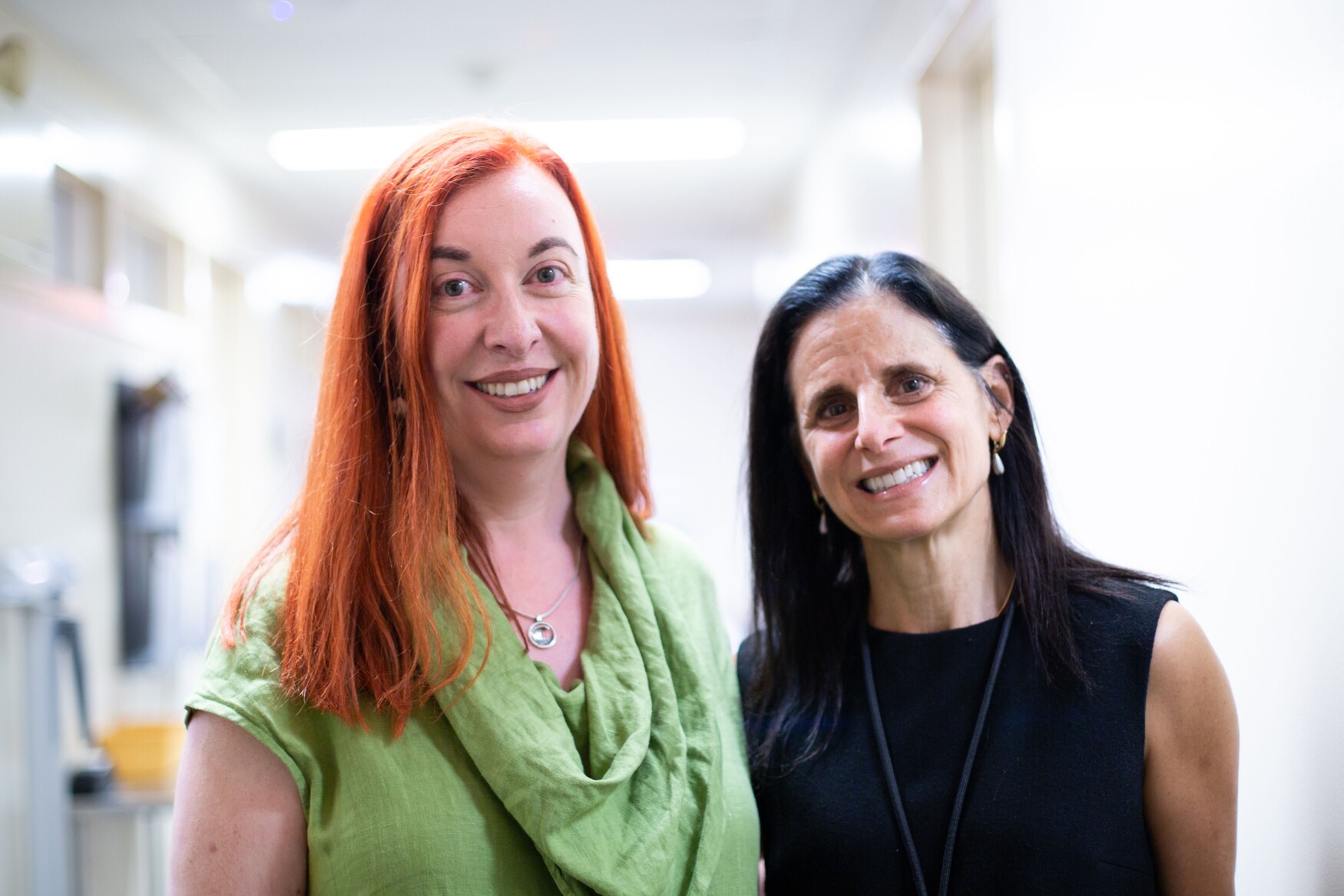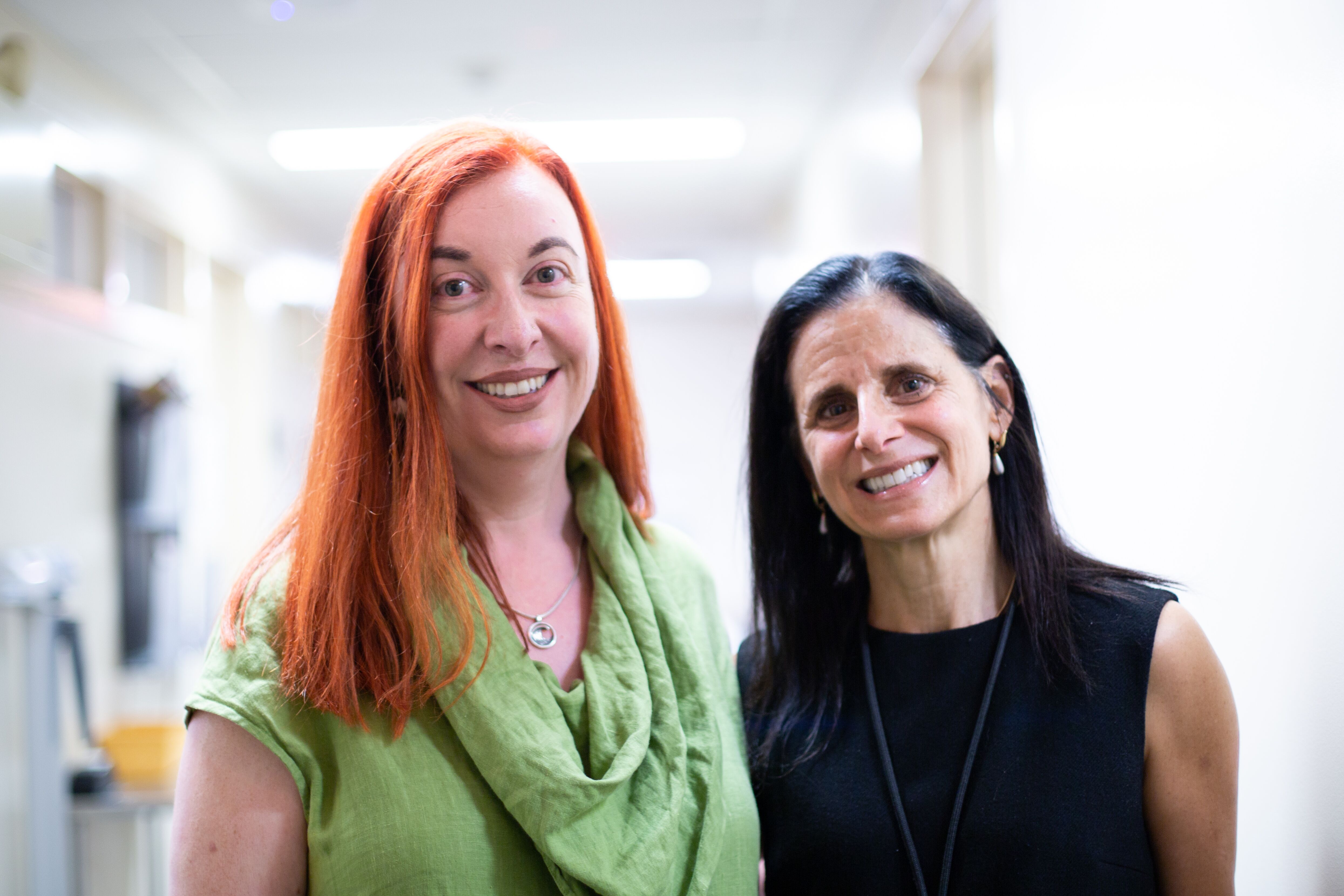Providing Inclusive Care to the Trans Community

Julia Soudat
 Thea Weisdorf and Sue Hranilovic specialize in providing primary care to non-binary and transgender individuals as part of the health team at the Health Centre at 410, St. Michael’s Hospital. Weisdorf is an Assistant Professor at the Department of Family and Community Medicine and has been working as a staff physician at the Health Centre at 410 since 1996. Hranilovic – a Primary Health Care Nurse Practitioner – has called it her clinical base since 1994. Over the course of their careers, Weisdorf and Hranilovic have seen trans care change significantly. They spoke to writer Julia Soudat about their practice, the need for more inclusive care and the hurdles still facing trans and non-binary communities.
Thea Weisdorf and Sue Hranilovic specialize in providing primary care to non-binary and transgender individuals as part of the health team at the Health Centre at 410, St. Michael’s Hospital. Weisdorf is an Assistant Professor at the Department of Family and Community Medicine and has been working as a staff physician at the Health Centre at 410 since 1996. Hranilovic – a Primary Health Care Nurse Practitioner – has called it her clinical base since 1994. Over the course of their careers, Weisdorf and Hranilovic have seen trans care change significantly. They spoke to writer Julia Soudat about their practice, the need for more inclusive care and the hurdles still facing trans and non-binary communities.
What got you interested in specializing in providing healthcare to trans and non-binary individuals?
Thea: It originated from a desire to help a friend navigate a health care system that was not very accessible to her gender questioning child. I identified a large gap in providing primary health care to transgender and gender non-binary youth and adults. With the incredible support of my department and colleagues, I have helped provide education to faculty and learners alike in the needs and care of this population, and that has been very rewarding.
Sue: As a queer-identified, white settler, I have professionally wanted to support members of my larger community, particularly folks who experience disadvantage and challenges in accessing care. I don’t work with many pediatric patients, but I feel I have the opportunity to watch people being born into who they have always been, and bearing witness is incredibly powerful for me.
What is the focus of your practice?
Thea: I provide primary care and gender-affirming care to my patients. This may include routine primary care and preventative screening, or initiation of gender affirming hormones, hormone blockers or support for transition-related surgery. My past fellowship training in substance abuse and addiction assists in identifying high-risk behaviours that may be seen in all patients, but have a higher than average prevalence in the transgender community.
Sue: I consider myself an “old nurse” of 30 years and a newer Nurse Practitioner of 7 years. I’ve been a consultant trainer with Rainbow Health Ontario since 2014, expanding capacity provincially by teaching about trans and gender diverse medical and surgical primary health care. My incredibly supportive work environment has provided the time and space needed to develop this clinical expertise. I feel very lucky that my current clinical practice is almost exclusively devoted to the overall primary care needs of trans and gender non-binary folk, which I endeavour to provide from an anti-oppressive, harm reduction, sex positive and health promotion perspective.
How has trans health care changed in the past few years?
Thea: Over the past few years, I have seen that providing gender affirming care and respecting our patients with things as simple as using proper pronouns, asking about supports and challenges faced throughout one’s gender journey and educating one about the specific health care needs not routinely taught in medical school, can enhance the trust and health of our patients. Providing patient-centered LGBTQIA2+ care has routinely been absent due to an environment of lack of experience, fear in doing the “wrong thing” and even a lack of interest in wanting to learn.
Sue: Trans and gender non-binary care has changed significantly, even in just the last 5 years. March 1, 2016 marked the beginning of primary health care leading the way in decreasing barriers to patients being able to access gender-affirming Ministry of Health (MOH) -funded surgeries in a timely way. I recall that day well, and I’ve taken a lead both provincially and at St. Mike’s Hospital to provide that training to staff and other Ontario providers. This shift marked the movement of trans and gender non-binary health care from solely a specialist level of care, to being integrated and fully within the scope of primary health care. Prescribing of gender-affirming hormones has become more of an individualized art in the last few years, as opposed to being solely guideline driven. The visibility and inclusion of folks with non-binary identities has fuelled this informed consent model of care provision and is a welcome change.
Do you think health care providers are getting better at addressing the needs of the trans and larger LGBTQ2S+ community?
Thea: Yes, I do see very positive changes in how people in health care are providing services to our LGBTQ2S+ populations. However, I also recognize that I work in a very unique environment where there are more resources, and more providers who see it as a priority to serve this community as well as other marginalized and under-serviced populations. It is not uncommon for me to be asked about accepting new transgender and non-binary patients into my practice when I speak to parents in the community who are trying to provide support for their children. Often, they say their child’s family physician or paediatrician is not comfortable in addressing the needs of these youth. One of my biggest goals is to mentor young physicians in their confidence and competence in the provision of primary care to these individuals and demystify and destigmatize their health care. As my respected colleague Sue has said, providing affirming and respectful health care is a human right.
Sue: I feel that we are moving in the right direction in Ontario, particularly with the amazing work being done by Sherbourne Health Centre and Rainbow Health Ontario in educating care providers. Toronto is a particularly resource-rich setting and I do worry about the paucity of services outside of large urban centres, where folks may experience significant social isolation, in addition to barriers to accessing care. Creating networks of dedicated, gender-supportive practitioners and continuing to advocate for the inclusion of LGBTQ2S+ health care needs within our professional school curriculums is a positive step in creating more access and ultimately improving health outcomes in the future for LGBTQ2S+ folk.
What are some of the hurdles still facing the community?
Thea: I believe more providers need to be knowledgeable in the care of trans and non-binary folk. Hormone prescribing for those seeking transition should be within the scope of primary care and support for surgical transition should be as well. Discussions with our patients around sexuality, fertility, preventative screening, aging, and dying should be inclusive and welcoming. Support for families of transgender and gender non-binary individuals needs to be part of our care and team-based care is essential. Finding trans-affirming services, consultants and mental health services for this population is in dire need and the absence of this significantly prevents our patients from receiving the care they deserve.
Sue: Ongoing hurdles include systemic barriers to respectful, validating and non-traumatizing care that are evidenced in all systems, including health care. Humane health care is a basic human right. Trans and non-binary folk deserve barrier-free access to gender-affirming care. Advocacy in the areas of access to safe, affordable housing, employment equity and access to additional MOH-funded gender-affirming surgeries and procedures (such as hair removal and facial feminization surgery) are needed. Integrating trans and non-binary care basics into all health care curriculum would further raise the bar. There is still a way to go, but in the meantime, I hope to continue nurturing the resilience of the clients I walk with, learn from and serve.
News



